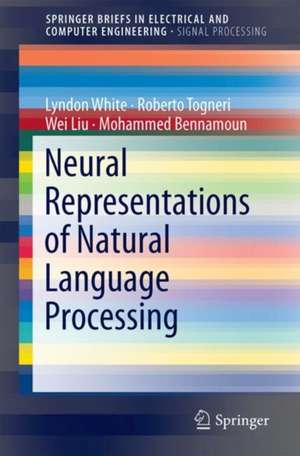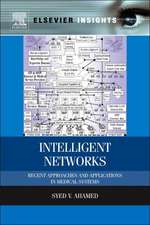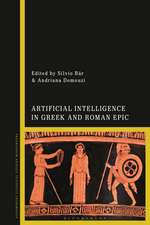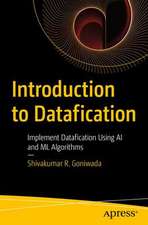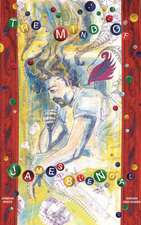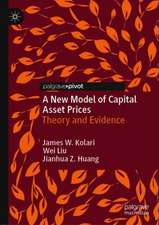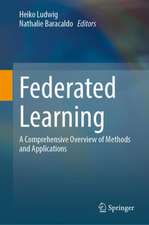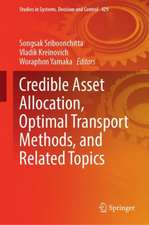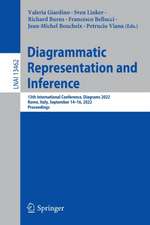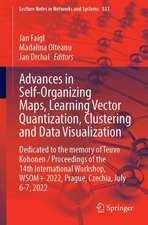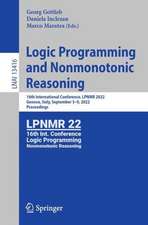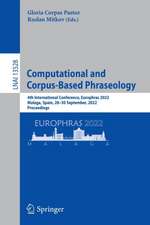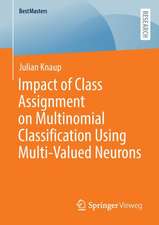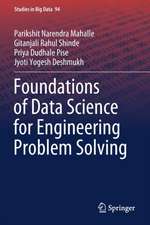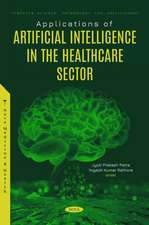Neural Representations of Natural Language: Studies in Computational Intelligence, cartea 783
Autor Lyndon White, Roberto Togneri, Wei Liu, Mohammed Bennamounen Limba Engleză Hardback – 18 sep 2018
| Toate formatele și edițiile | Preț | Express |
|---|---|---|
| Paperback (1) | 495.48 lei 38-44 zile | |
| Springer Nature Singapore – 16 dec 2018 | 495.48 lei 38-44 zile | |
| Hardback (1) | 582.58 lei 6-8 săpt. | |
| Springer Nature Singapore – 18 sep 2018 | 582.58 lei 6-8 săpt. |
Din seria Studies in Computational Intelligence
- 50%
 Preț: 264.48 lei
Preț: 264.48 lei - 20%
 Preț: 1149.72 lei
Preț: 1149.72 lei - 20%
 Preț: 979.38 lei
Preț: 979.38 lei - 20%
 Preț: 1442.03 lei
Preț: 1442.03 lei - 20%
 Preț: 168.78 lei
Preț: 168.78 lei - 18%
 Preț: 1104.09 lei
Preț: 1104.09 lei - 20%
 Preț: 565.38 lei
Preț: 565.38 lei - 20%
 Preț: 644.49 lei
Preț: 644.49 lei - 20%
 Preț: 1039.99 lei
Preț: 1039.99 lei - 20%
 Preț: 1567.29 lei
Preț: 1567.29 lei - 20%
 Preț: 638.76 lei
Preț: 638.76 lei - 20%
 Preț: 652.66 lei
Preț: 652.66 lei - 20%
 Preț: 985.95 lei
Preț: 985.95 lei - 20%
 Preț: 983.49 lei
Preț: 983.49 lei - 20%
 Preț: 982.67 lei
Preț: 982.67 lei - 20%
 Preț: 1157.08 lei
Preț: 1157.08 lei - 20%
 Preț: 1433.84 lei
Preț: 1433.84 lei - 20%
 Preț: 1034.27 lei
Preț: 1034.27 lei - 20%
 Preț: 1039.99 lei
Preț: 1039.99 lei - 20%
 Preț: 1038.35 lei
Preț: 1038.35 lei - 18%
 Preț: 2482.01 lei
Preț: 2482.01 lei - 20%
 Preț: 981.84 lei
Preț: 981.84 lei - 20%
 Preț: 1157.08 lei
Preț: 1157.08 lei - 20%
 Preț: 1155.44 lei
Preț: 1155.44 lei - 20%
 Preț: 1035.10 lei
Preț: 1035.10 lei - 20%
 Preț: 1449.39 lei
Preț: 1449.39 lei - 18%
 Preț: 1393.16 lei
Preț: 1393.16 lei - 18%
 Preț: 1116.60 lei
Preț: 1116.60 lei - 20%
 Preț: 1031.80 lei
Preț: 1031.80 lei - 20%
 Preț: 1000.67 lei
Preț: 1000.67 lei - 20%
 Preț: 1037.55 lei
Preț: 1037.55 lei - 20%
 Preț: 1265.99 lei
Preț: 1265.99 lei - 20%
 Preț: 1032.63 lei
Preț: 1032.63 lei - 20%
 Preț: 981.05 lei
Preț: 981.05 lei - 20%
 Preț: 1161.15 lei
Preț: 1161.15 lei - 20%
 Preț: 1153.80 lei
Preț: 1153.80 lei - 20%
 Preț: 1051.45 lei
Preț: 1051.45 lei - 20%
 Preț: 1155.44 lei
Preț: 1155.44 lei - 20%
 Preț: 1157.91 lei
Preț: 1157.91 lei - 20%
 Preț: 1448.60 lei
Preț: 1448.60 lei - 18%
 Preț: 998.33 lei
Preț: 998.33 lei - 20%
 Preț: 990.03 lei
Preț: 990.03 lei - 20%
 Preț: 1048.16 lei
Preț: 1048.16 lei - 20%
 Preț: 1274.98 lei
Preț: 1274.98 lei - 20%
 Preț: 986.74 lei
Preț: 986.74 lei - 20%
 Preț: 1040.98 lei
Preț: 1040.98 lei - 20%
 Preț: 936.82 lei
Preț: 936.82 lei - 20%
 Preț: 1164.44 lei
Preț: 1164.44 lei - 20%
 Preț: 1446.94 lei
Preț: 1446.94 lei - 20%
 Preț: 1037.55 lei
Preț: 1037.55 lei
Preț: 582.58 lei
Preț vechi: 728.23 lei
-20% Nou
Puncte Express: 874
Preț estimativ în valută:
111.57€ • 114.95$ • 93.47£
111.57€ • 114.95$ • 93.47£
Carte tipărită la comandă
Livrare economică 22 februarie-08 martie
Preluare comenzi: 021 569.72.76
Specificații
ISBN-13: 9789811300615
ISBN-10: 9811300615
Pagini: 131
Ilustrații: XIV, 122 p. 36 illus., 31 illus. in color.
Dimensiuni: 155 x 235 mm
Greutate: 0.37 kg
Ediția:1st ed. 2019
Editura: Springer Nature Singapore
Colecția Springer
Seria Studies in Computational Intelligence
Locul publicării:Singapore, Singapore
ISBN-10: 9811300615
Pagini: 131
Ilustrații: XIV, 122 p. 36 illus., 31 illus. in color.
Dimensiuni: 155 x 235 mm
Greutate: 0.37 kg
Ediția:1st ed. 2019
Editura: Springer Nature Singapore
Colecția Springer
Seria Studies in Computational Intelligence
Locul publicării:Singapore, Singapore
Cuprins
Introduction.- Machine Learning for Representations.- Current Challenges in Natural Language Processing.- Word Representations.- Word Sense Representations.- Phrase Representations.- Sentence representations and beyond.- Character-Based Representations.- Conclusion.
Textul de pe ultima copertă
This book offers an introduction to modern natural language processing using machine learning, focusing on how neural networks create a machine interpretable representation of the meaning of natural language. Language is crucially linked to ideas – as Webster’s 1923 “English Composition and Literature” puts it: “A sentence is a group of words expressing a complete thought”. Thus the representation of sentences and the words that make them up is vital in advancing artificial intelligence and other “smart” systems currently being developed. Providing an overview of the research in the area, from Bengio et al.’s seminal work on a “Neural Probabilistic Language Model” in 2003, to the latest techniques, this book enables readers to gain an understanding of how the techniques are related and what is best for their purposes. As well as a introduction to neural networks in general and recurrent neural networks in particular, this book details the methods used for representing words, senses of words, and larger structures such as sentences or documents. The book highlights practical implementations and discusses many aspects that are often overlooked or misunderstood. The book includes thorough instruction on challenging areas such as hierarchical softmax and negative sampling, to ensure the reader fully and easily understands the details of how the algorithms function. Combining practical aspects with a more traditional review of the literature, it is directly applicable to a broad readership. It is an invaluable introduction for early graduate students working in natural language processing; a trustworthy guide for industry developers wishing to make use of recent innovations; and a sturdy bridge for researchers already familiar with linguistics or machine learning wishing to understand the other.
Caracteristici
Enriches readers’ understanding of how neural networks create a machine interpretable representation of the meaning of natural language Absolutely packed with useful insights drawn from experience using and implementing these algorithms Includes two introductory chapters on neural networks, allowing novice readers to quickly understand how machine learning is revolutionizing the field of natural language processing
